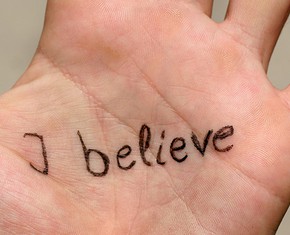The views expressed in our content reflect individual perspectives and do not represent the authoritative views of the Baha'i Faith.
I often read dystopian books and watch dystopian films. While asking provocative questions about humanity’s fate, they typically portray the future as a dark, troubled place.
Less common are books and films that compare the present to the past, and ask us to consider whether earlier times were better than the present.
Or is it just a longing for a different time? If not an earlier time, then would living in the future be better? Or is this whole thing just another example of the cliché “the grass is always greener on the other side of the fence”? Perhaps it is merely a symptom of discontent. So what is contentment anyway? We often think of it as being a feeling of physical comfort and ease. After a busy day we sit back, relax, and sigh with contentment.
We know that animals are content when their physical needs are met. They don’t pass judgment about time or place. They live and even prosper when they have enough food, water, an ambient temperature, and a satisfactory social structure.
As physical beings we have much in common with animals—yet we are vastly more. We have powers of thought and free will far beyond the comprehension of animals. These words from the Baha’i teachings enlarge this idea:
How can man be content to lead only an animal existence when God has made him so high a creature? … But to man God has given such wonderful power that he can guide, control and overcome nature. – Abdu’l-Baha, Paris Talks, p. 122.
This power comes with great responsibilities, which are mitigated through our reality as spiritual beings. As such, a moral conscience guides and directs us, telling us to look for the greater good in our deeds, prompting us to do unto others as we would like them to do unto us. Since nothing happens in isolation, we need to consider our impact on the planet and other people. In contrast to animals, which simply act according to the fixed laws of nature, we contribute through our work. Because this comes through free will, it is another source of contentment and satisfaction.
We also experience contentment when we feel secure within a supportive social environment. Having a loving family, loyal friends, congenial neighbors, and cooperative colleagues can make us joyful and contented, even when other circumstances prove difficult.
If we extend our thinking about this immediate social environment to the larger community, then we can be content when we trust that other people will help take care of the essentials. Living in a well-organized society where all residents can depend on infrastructure and continuity of governance is a great blessing. Far from taking these things for granted, I am grateful for being relieved of daily worries about items such as clean water and dependable power supplies.
But how do we find contentment when things aren’t going well?
Contentment in harsh circumstances can be learned from Baha’u’llah and Abdu’l-Baha, both of whom were long-time prisoners in some of the harshest prisons in the world. Yet they both wrote that even in those circumstances they were happy and content, because they had transcended the physical and were connected to higher, more spiritual realms.
Paraphrasing a passage from Baha’u’llah’s mystical book The Seven Valleys, Adib Taherzadeh wrote: “Only those who have entered the valley of contentment have experienced true joy, even though their lives be subjected to affliction and suffering.” – The Revelation of Baha’u’llah, Volume 1, p. 100.
There is a lesson in this as well: each of us is where and when we need to be, and we have choices about how we regard our lives here and now.
Every place and time have their own challenges and needs, and this is where contentment needs to be separated from complacency. Being content does not mean we should be lulled into complacency. On the contrary, contentment can be the launching point, allowing movement from strength to strength. Being content and happy with where and when I am living allows me to be actively engaged in improving my character and contributing to the advancement of society.
Dwelling in nostalgia can be distracting. It is better to learn from the past and apply those lessons. Likewise, if I look so far into the future that I become removed from the present then I will miss opportunities here and now. It is better to have a goal in mind and work toward it.
If I do this, then the answer to the question “Was the past better?” is “no”—and the question “Will the future be better?” gets a confident “yes.”
















Comments
Sign in or create an account
Continue with Googleor